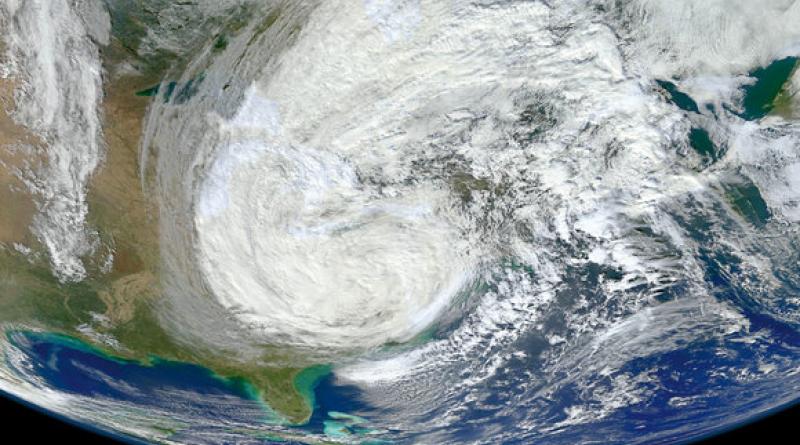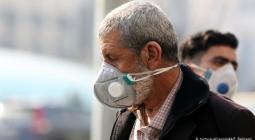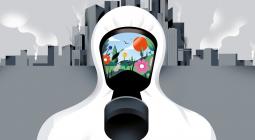Are the climate and coronavirus crises really so alike?

There are similarities between the coronavirus and the climate emergencies, but what should really scare us are the differences
Over the past fortnight the coronavirus pandemic has triggered a surge in hot takes highlighting the unnerving similarities between the global public health emergency and the worsening climate emergency that runs alongside it.
Commentators from the UN Secretary General down, taking in almost the full breadth of the political spectrum, have noted how Covid-19 has exposed precisely the same long tail risks, institutional brittleness, structural absence of redundancy, socio-economic injustices, geopolitical tensions, cavalier insouciance towards environmental risks and limits, amoral misinformation campaigns and crazed conspiracy theories, and ideological hubris that have characterised the stuttering response to the climate crisis for over a decade.
As the former Guardian editor Alan Rusbridger noted: "the main lesson we have to learn is this: Covid-19 is a dress rehearsal for climate change…"
It is a point that was echoed late last week by BP CEO Bernard Looney, who in a quietly remarkable blog post stressed that the pandemic would not compromise the company's newly announced pledge to deliver net zero emissions.
Whether you regard BP's net zero strategy as a turning point in global decarbonisation efforts or the latest in a long line of egregious greenwashing tactics, it is hard to argue with Looney's hypothesis that in response to both the coronavirus and climate crisis businesses must look beyond the profit motive; corporations, governments, and civil society must co-operate; and innovators must first imagine and then deliver a sharp break with business-as-usual.
"To understand and respond to the threat of climate change we need to imagine the risks of inaction, the range of responses available to us and their implications," Looney argued. "This is what the scale and severity of Covid-19 is forcing us to do today as the worst impacts cross the boundary from imagination into reality. People talk about 'the art of the possible', the current crisis is redefining 'possible' day by day. We should reflect on that next time someone says that tackling climate change is too difficult, or too costly." Amen to that.
And yet, while the many parallels between the climate and coronavirus crises are informative and worthy of comment, why does the attempt to draw analogies make me a little uneasy?
The truth is that while there are plenty of similarities between the two crises there are differences too. The most obvious and most pertinent is that to most people they feel very different. Climate change is an intensification of threats and risks we already understand; a global pandemic, at least for those lucky enough to live in the relatively comfortable West, feels alien and visceral. Moreover, climate change is a slow burn (although not that slow) long term threat playing out over decades. Coronavirus is like a disaster film running on fast forward, each day bringing worse news. Millions may die from climate impacts, but there is no way of keeping a terrifying running tally that will lead news bulletins around the world.
These distinctions are important, because at a time when climate sceptic lobbyists and commentators are ignoring the fact that their entire value system is imploding before their eyes and are instead looking for any and all means to exploit the pandemic to further their polluting goals, the suggestion that we should 'forget the climate emergency, because this is what a real emergency looks like' could prove to be a dangerously compelling narrative.
The comparisons between the coronavirus and the climate crises make a lot of sense, but at their root they are guilty of a category error.
The coronavirus pandemic is an impact, an event - a tragic and world-changing event to be sure, not to mention a crisis that could yet unleash even more terrifying second order impacts as nationalist governments seize the opportunity to crack down on civil liberties and ratchet up bellicose rhetoric. But ultimately coronavirus is a disaster with an ascribed beginning and eventual end.
In contrast, climate change is, to quote the US writer and futurist Alex Steffen, "not an issue, it's an era".
Climate change is the context within which everything happens. It is the backdrop for the 21st century. It is a risk multiplier; a nexus for multiple threat vectors, some of which we haven't even realised yet.
If we are to draw parallels between the climate crisis and the pandemic then the correct analogy is not between carbon emissions and the coronavirus, but between climate breakdown and the wildlife trade. Or, if you want to go broader still, climate breakdown and our dysfunctional systems for meat production.
The wildlife trade was the risk multiplier that - precisely as numerous experts warned it would - eventually gave us a novel virus that has killed thousands and counting, grinding the global economy to a shuddering halt in the process. It is surely worth noting that other catastrophic impacts could flow from our reckless meat production processes, including but not limited to further viral outbreaks, antibiotic resistance, and deforestation and over-fishing driving ecosystem collapse.
All of which leads to a terrifying question, if climate change is the wildlife trade in our analogy, what then is the climate-related equivalent of the coronavirus pandemic?
The answer is to be found in all those second order climate impacts that IPCC reports hint at but never quite spell out because they fall outside the bounds of strict scientific inquiry.
For starters, businesses and policymakers mulling the damage being wrought by coronavirus and asking what other low probability, high impact risks they should be considering, would be advised to reflect on what happens when climate impacts intensify and start to occur concurrently.
What happens if sea levels rise and five mega-storms make US landfall in the same year? Would the insurance industry collapse? What happens if entire cities become uninsurable and millions of property assets are left unsellable? Could the global financial system operate under such duress?
What happens if the monsoons fail and Himalayan water supplies shared by three nuclear powers become unreliable? Would they co-operate to manage a suddenly scarce resource or would historic antipathies come to the fore?
What happens if harvests fail completely and repeatedly across North Africa, the Gulf, and Latin America sparking a level of migration towards Europe and North America completely unprecedented in human history? Would the international community collectively manage the humanitarian crisis or would the recent uptick in beggar thy neighbour nationalism come to define the age, with the loss of millions of lives a direct consequence?
What happens if rising global temperatures and the continued loss of natural habitats expand disease vectors and increase the incidence of novel viruses, turning pandemics into a three or four times a century occurrence? What then?
None of these apocalyptic scenarios are inevitable. There are good reasons to think we can yet minimise climate impacts and drastically enhance global resilience. Even on our current emissions trajectories these terrifying prospects remain worst case scenarios. But they are also all plausible outcomes that become more likely with each increment of temperature increase. And, as we are all discovering, worst case scenarios can and do come to pass.
There are lots of useful lessons to be learnt from the coronavirus crisis as the world shapes its response to the longer term threat presented by climate change. But chief among them is the need to recognise that the climate crisis is a fundamentally different beast, and it is long past time that the horrors it could unleash were taken seriously.The climate crisis is not really like the coronavirus crisis in several critical ways. And as such perhaps climate should not be reflexively referred to as a 'crisis' or an 'emergency'. Because fundamentally it's much worse than that.
A version of this article originally appeared in the BusinessGreen Overnight Briefing email, which is available to all BusinessGreen subscribers.
7 April 2020
Business Green





